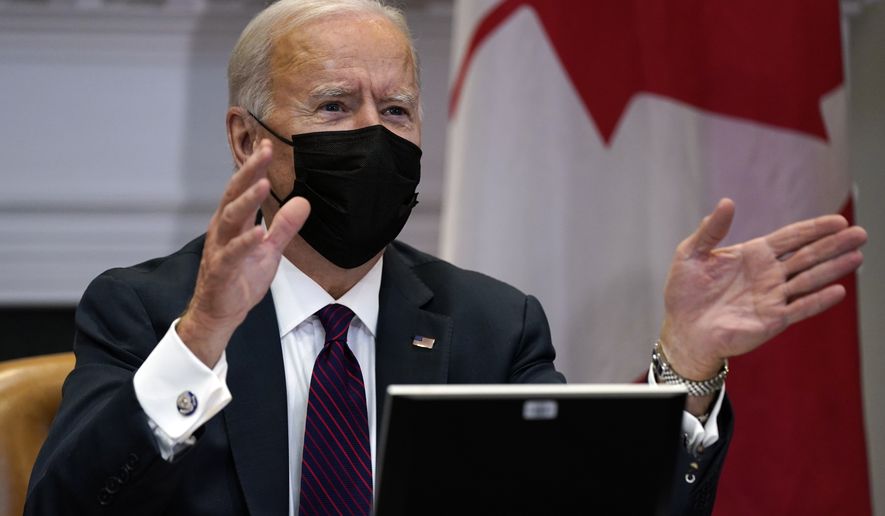President Biden and Canadian Prime Minister Justin Trudeau pledged Tuesday to unite in fighting COVID-19, but the United States’ northern neighbor is being left behind in a key way — despite buying enough doses to vaccinate its population several times over, it is a global laggard in getting shots in arms.
The slow start is because of Canada’s lack of homegrown vaccine production and reliance on imports that were hampered by manufacturing delays at a Pfizer plant in Europe, even as the U.S. is fed a steady supply from a plant in Kalamazoo, Michigan, about 140 miles from Ontario.
“You can literally drive [doses] to Canada in a couple of hours. But we have to get our vaccines through Belgium,” said Isaac Bogoch, an infectious disease specialist at Toronto General Hospital.
Mr. Biden and Mr. Trudeau said they will commit to combatting climate change and enhancing the North American Aerospace Defense Command, and the Canadian leader said his country is sending power to beleaguered Texas. The pair didn’t publicly address vaccine access in an unusual bilateral meeting conducted by telelink, though they said they would work together to beat the virus.
“We’re standing united in this fight,” Mr. Trudeau said.
The White House said it will focus on vaccinating Americans before it looks for ways to spread doses to Canada and elsewhere. While it likely will send vaccines north once the U.S. market is sated, the administration couldn’t provide a timetable Tuesday.
“There are multiple ways we can work together on a COVID response,” said White House press secretary Jen Psaki. “All options are on the table down the road. I don’t have anything to update you on about Pfizer providing vaccinations, other than we remain committed to getting Americans vaccinated.”
For now, Canada is banking on a recent uptick in shipments and expected windfall by late March to play catch-up in vaccinating its nation of 38 million.
Current metrics put Canada behind other big nations. It has delivered slightly more than 4 doses per 100 residents compared to more than 19 per 100 in the U.S., according to OurWorldinData.org.
Major parts of the European Union got off to sluggish starts, too, with Germany and France at 6 and 5.5 per 100, respectively.
Israel is the king of per-capita vaccinations currently. The nation of roughly 9 million is celebrating a shift to normalcy after about half of its population was vaccinated due to its technologically advanced health system and aggressive purchases of Pfizer’s vaccine in exchange for medical data.
“They are serving as a demonstration ground for what happens with mass vaccination and getting the majority of the country vaccinated quickly,” said Krishna Udayakumar, the founding director of the Duke Global Health Innovation Center. “In the last few days and weeks, some incredible data coming for the health system showing a reduction in hospitalization and deaths and a reduction in transmission. We are generating better data because of the route Israel has taken.”
Other studies are hinting at a way to stretch global vaccine supply: Previously infected persons might do just fine after the first dose of a messenger-RNA vaccine from Pfizer or Moderna.
In a blog post, National Institutes of Health Director Francis Collins said if more studies back up the findings, the Food and Drug Administration “might decide to consider whether one dose is enough for people who’ve had a prior COVID-19 infection.”
“Such a policy is already under consideration in France and, if implemented, would help to extend vaccine supply and get more people vaccinated sooner,” he wrote.
Experts said Canada got an early start on its vaccination campaign and made good bets in securing doses from successful drugmakers. But efforts to spur domestic production of the vaccines won’t take off until at least the fall, leaving Canada reliant on foreign shipments.
“Even though we have contracts and arrangements with these companies, it doesn’t mean you can get as much as you want, whenever you want,” Dr. Bogoch said.
Pfizer said its Michigan facility is approved by Canadian regulators to serve their market, but “the supply to Canada has been allocated from our Puurs site in Belgium for the time being.”
“Our facility in Kalamazoo is the primary manufacturing site of our COVID-19 vaccine in the U.S. Our Puurs site is supplying the rest of the world,” said Christina Antoniou, director of corporate affairs for Pfizer Canada. “We are producing millions of doses of our COVID-19 vaccine each day. Putting two parallel supply chains in place — one in the U.S. and one rest of world — ensures that our efforts are robust and have the appropriate redundancies.”
She said there were three weeks of reduced deliveries in January and February as the company modified its Belgian facility to scale up manufacturing. Those changes are done, so the company began to speed up deliveries last week.
Pfizer said it will be able to accelerate deliveries to Canada in the second and third quarters of this year and meet its commitment of 40 million doses by the end of September.
Dr. Bogoch said he expects Canada to massively scale up its campaign by the end of March.
“That’s when the taps really turn on,” he said. “Coast to coast.”
• Tom Howell Jr. can be reached at thowell@washingtontimes.com.




Please read our comment policy before commenting.